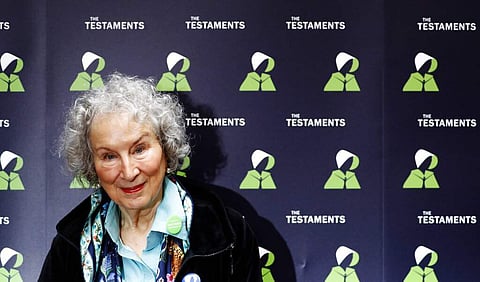
- LIFESTYLE
- FASHION
- FOOD
- ENTERTAINMENT
- EVENTS
- CULTURE
- VIDEOS
- WEB STORIES
- GALLERIES
- GADGETS
- CAR & BIKE
- SOCIETY
- TRAVEL
- NORTH EAST
- INDULGE CONNECT

LONDON (AP): Canadian writer Margaret Atwood and British author Bernardine Evaristo split the Booker Prize on Monday, after the judging panel ripped up the rulebook and refused to name one winner for the prestigious fiction trophy.
Chairman Peter Florence said the five judges simply couldn't choose between Atwood's dystopian thriller The Testaments and Evaristo's kaleidoscope of black women's stories, Girl, Woman, Other.
Partly inspired by the environmental protesters of Extinction Rebellion, who were demonstrating near the prize ceremony's venue in London's financial district, Florence said the judges refused to back down when told the rules prohibit more than one winner.
"Our consensus was that it was our decision to flout the rules," he said. "I think laws are inviolable and rules are adaptable to the circumstance."
Prize organisers didn't see it that way. Gaby Wood, literary director of the Booker Prize Foundation, said prize trustees repeatedly told the judges they couldn't have two winners, but they "essentially staged a sit-in in the judging room" as deliberations dragged on for five hours.
Wood insisted the decision "doesn't set a precedent." It means Atwood and Evaristo will split the 50,000 pound ($63,000) Booker Prize purse.
Florence said both of the winning books "address the world today and give us insights into it and create characters that resonate with us."
"They also happen to be wonderfully compelling page-turning thrillers," he added.
Both winners said they were happy to share the prize.
"It would have been quite embarrassing for a person of my age and stage to have won the whole thing and thereby have kept a younger one, at a different stage of their career, from going through that door," said Atwood, who at 79 is the oldest-ever Booker winner.
Evaristo said winning the Booker was something that "felt so unattainable for decades." "So I'm just absolutely delighted to have the prize and to share the prize," she said.
Atwood, who won the Booker in 2000 for The Blind Assassin, had been the bookmakers' favourite to win the coveted trophy for a second time with her follow-up to The Handmaid's Tale.
Like that book — now a hit TV series — The Testaments is set in Gilead, a theocratic republic taken root in the United States, where young women are forced to bear children for powerful men.
Florence, founder of the Hay literary festival, said Atwood's novel "does massively more" than just continue the story started in The Handmaid's Tale.
"It's beautiful in its depth and exploration of the world of Gilead," he said. It might have looked like science fiction back in the day. Now it looks more politically urgent than ever before."
Evaristo, who is of Anglo-Nigerian heritage, is the first black woman to take the trophy.
"I hope that honour doesn't last too long," she said. She has published seven previous books but is less known than her co-winner.
Florence said he wasn't worried Evaristo, 60, would be overlooked as people focused on Atwood. He said that "there is something utterly magical" about the 12 characters from many walks of life who narrate Girl, Woman, Other.
"They give a wonderful spectrum of black British women today," he said. "In that sense this book is ground-breaking — and I hope encouraging, and inspiring to the rest of the publishing industry."
Founded in 1969, the prize is open to English-language authors from around the world. It has been split between two winners twice before, most recently in 1992, when Michael Ondaatje's The English Patient and Barry Unsworth's Sacred Hunger shared the trophy.
The rules were changed after that to stipulate there can only be one winner each year.
Judges chose the two winners from a six-book shortlist that included British-Turkish author Elif Shafak's Istanbul-set 10 Minutes 38 Seconds in This Strange World; US-British writer Lucy Ellmann's stream-of-consciousness novel Ducks, Newburyport; India-born British writer Salman Rushdie's modern-day Don Quixote story, Quichotte; and An Orchestra of Minorities, a saga of love and exile by Nigeria's Chigozie Obioma.
The prize, which often delivers a big boost in sales and profile to the winner, was sponsored for 18 years by investment firm Man Group and was known as the Man Booker Prize.
This year it reverted to its original name, the Booker Prize, under a new sponsor: the Crankstart Foundation, founded by Silicon Valley venture capitalist Michael Moritz and his wife, writer Harriet Heyman.
Booker Prize 2019: Bookies back Atwood, Shafak, Ellmann over Rusdhie and others
'Disagreements keep families together': Smriti Irani at launch of Kaveree Bamzai's new book
Nobel winner Tokarczuk's Polish hometown offers free public rides for bookworms
Reactions report: Should Literature Nobel Prize be revoked for Austrian Peter Handke?
Liberal Pole and Austrian apologist? Literature Nobel Prizes expose Europe's fault lines